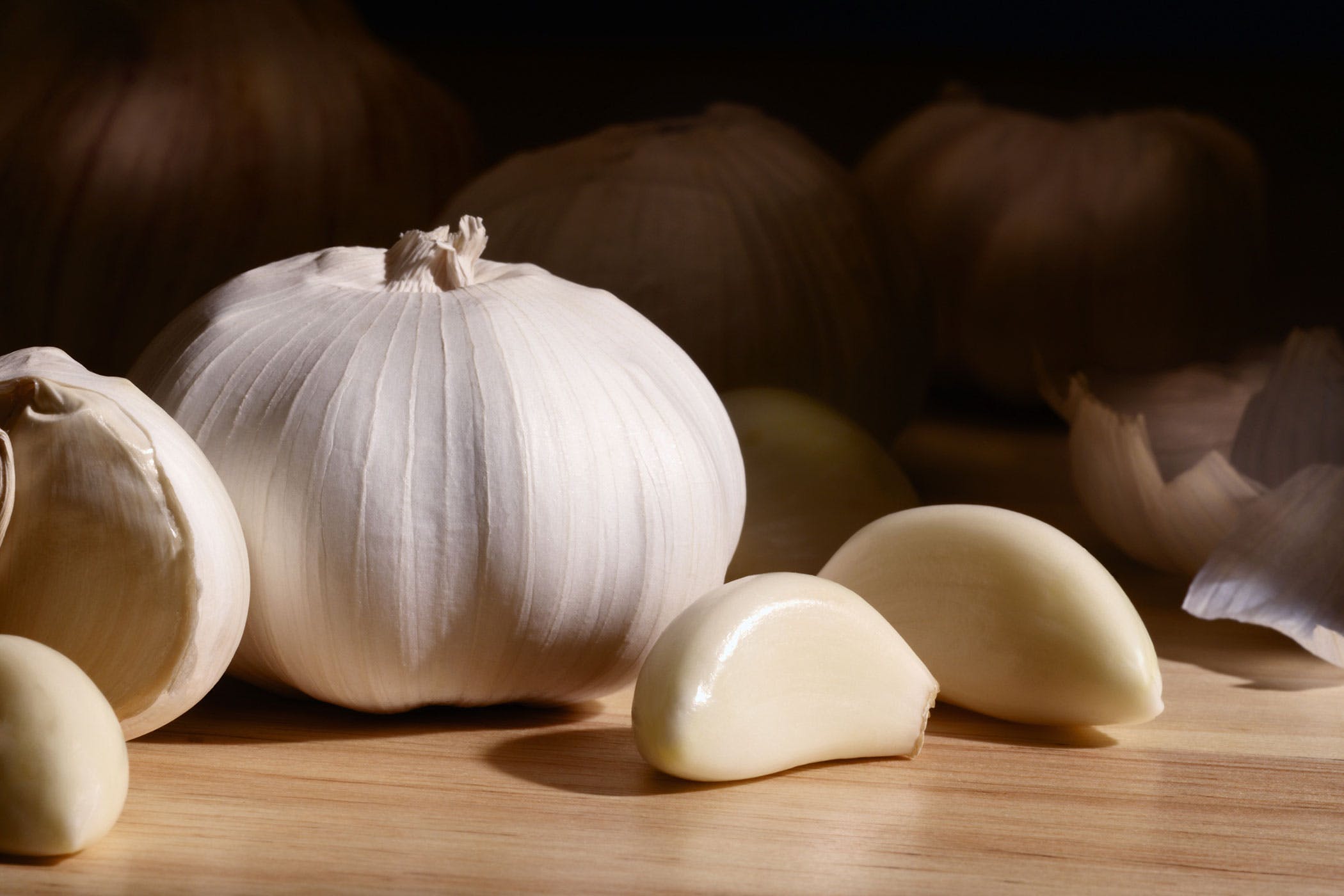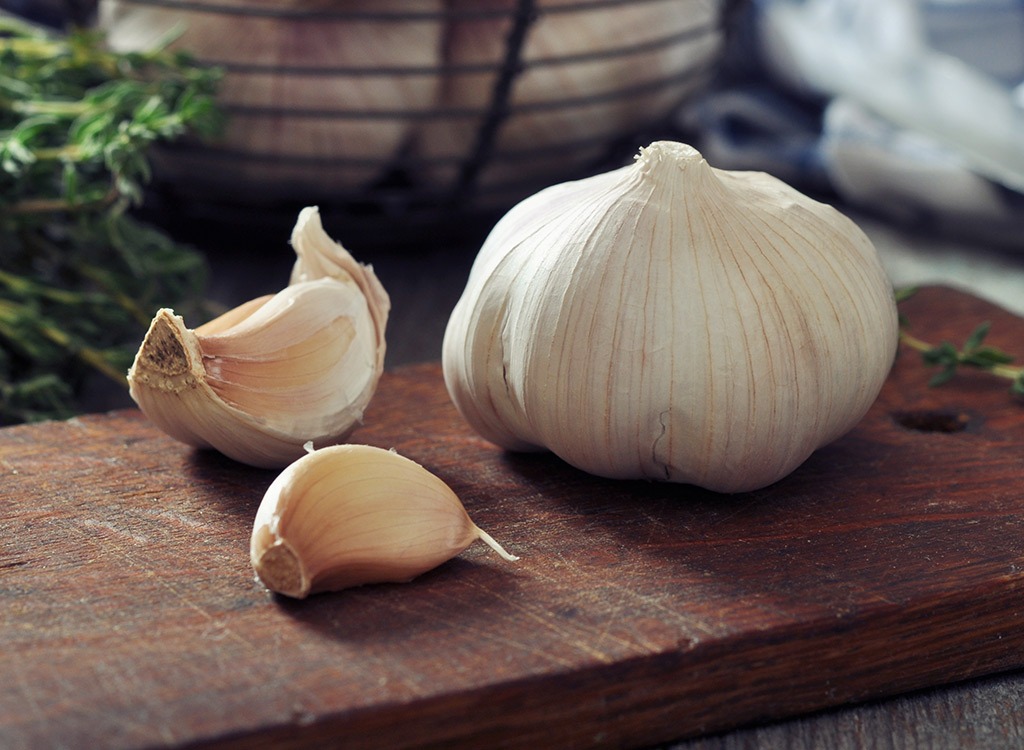What Happens to Your Body When You Eat Garlic Regularly
Garlic, often known for its pungent aroma and distinctive flavor, has been a staple in culinary traditions around the world for centuries. Beyond its culinary uses, garlic is celebrated for its potential health benefits. From supporting the immune system to potentially aiding in lowering cholesterol, the regular consumption of garlic may have a range of positive effects on the body. In this article, we’ll explore the nutrition facts and health benefits of garlic, shedding light on what happens to your body when you make garlic a regular part of your diet.
Garlic Nutrition Facts

Garlic not only adds depth and richness to dishes but also contributes essential nutrients. Here are the nutrition facts for three cloves of raw garlic, according to the USDA:
| Nutrient | Amount |
|---|---|
| Calories | 13 |
| Total Carbohydrates | 3g |
| Dietary Fiber | 0g |
| Total Sugars | 0g |
| Protein | 0.5g |
| Total Fat | 0g |
| Sodium | 1.5mg |
| Potassium | 36mg |
| Vitamin C | 2.8mg |
While the volume of garlic typically consumed is small, it contains health-promoting nutrients such as vitamin C, zinc, iron, potassium, magnesium, and vitamin K. Regular consumption of garlic can ensure a greater intake of these vital vitamins and minerals.
Health Benefits of Eating Garlic Regularly
Helps Support Your Immune System
Chronic inflammation can compromise immunity by reducing white blood cell count. Garlic, with its antimicrobial properties, has been linked to strengthening the immune system. Allicin, a compound found in garlic, exhibits potent antibacterial and antiviral properties, which may help the body fight off infections and illnesses.
Garlic’s immune-boosting effects are attributed to its sulfur-containing compounds, which stimulate the activity of immune cells like macrophages and lymphocytes. By incorporating garlic into your daily diet, you may be providing your body with an extra layer of defense against common colds, flu, and other infections.
You May Lower Your Cholesterol
High levels of LDL cholesterol can increase the risk of heart disease. Studies suggest that garlic may help lower total and LDL cholesterol levels. Allicin, once again, plays a crucial role in this aspect. It inhibits the synthesis of cholesterol and helps reduce the formation of plaque in the arteries, thus potentially lowering the risk of cardiovascular diseases.
Regular consumption of garlic, combined with a balanced diet and healthy lifestyle, may contribute to maintaining healthy cholesterol levels and promoting heart health.
You Might Have Lower Blood Pressure
Hypertension, or high blood pressure, is a significant risk factor for heart disease and stroke. Research indicates that garlic supplementation may lead to modest reductions in blood pressure. Allicin and other sulfur compounds in garlic promote the widening of blood vessels, which can help regulate blood pressure.
By including garlic in your meals regularly, you may support healthy blood pressure levels and reduce the risk of developing hypertension.
You May Have Better Blood Sugar Levels
For individuals managing diabetes or those at risk of developing the condition, maintaining stable blood sugar levels is crucial. Some studies suggest that garlic may aid in improving insulin sensitivity and regulating blood sugar levels. The sulfur compounds in garlic are believed to play a role in enhancing insulin secretion and improving glucose metabolism.
Incorporating garlic into your diet, alongside other healthy lifestyle choices, may contribute to better blood sugar control and overall metabolic health.
You May Have Better Gut Health
The prebiotic properties of garlic can benefit gut health by promoting the growth of beneficial gut bacteria. These bacteria play a crucial role in digestion, nutrient absorption, and immune function. Additionally, garlic exhibits antimicrobial properties that may help combat harmful bacteria in the digestive system, contributing to a healthier gut environment.
Regular consumption of garlic may support a balanced and thriving gut microbiome, which is essential for overall digestive wellness.
Other Potential Benefits
Beyond the aforementioned benefits, garlic consumption has been associated with other potential advantages, including antioxidant properties that help combat oxidative stress, as well as anti-inflammatory effects that may alleviate symptoms of certain inflammatory conditions.
Moreover, some studies suggest that garlic may have anticancer properties, although more research is needed to fully understand its impact on cancer prevention and treatment.
How to Incorporate Garlic into Your Diet

Adding garlic to your meals can be simple and delicious. Whether raw, cooked, or as a supplement, there are numerous ways to include this flavorful ingredient in your diet. Here are a few ideas to incorporate more garlic into your meals:
- Raw Garlic: Add minced or crushed garlic to salad dressings, salsas, or homemade dips for a fresh and zesty flavor.
- Cooked Dishes: Enhance the taste of soups, stews, stir-fries, and roasted vegetables by adding finely chopped or crushed garlic during cooking.
- Roasted Garlic: Spread roasted garlic over whole-grain bread or mix it into mashed potatoes for a savory twist.
- Garlic Supplements: If you’re not fond of the taste or smell of garlic, consider taking odorless garlic supplements, available in various forms such as capsules or oils.
By experimenting with different cooking methods and recipes, you can find enjoyable ways to integrate garlic into your daily meals, reaping its potential health benefits while elevating the flavors of your dishes.
Video

Conclusion

The regular consumption of garlic offers a myriad of potential health benefits, ranging from immune support to heart health and beyond. Its rich nutritional profile, coupled with its versatile culinary applications, makes it a valuable addition to a balanced diet. While garlic can enhance the taste of your favorite dishes, it may also contribute to your overall well-being. As with any dietary change, it’s essential to consult with a healthcare professional, especially if you have existing medical conditions or are taking medications, to ensure that incorporating garlic aligns with your individual health needs. Embracing garlic as a regular part of your diet may just be the flavorful and health-conscious choice you’ve been looking for.













